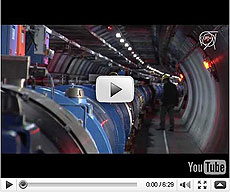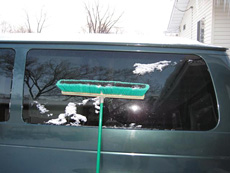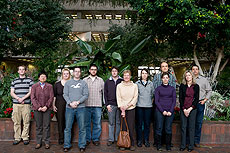|
Have a safe day!
Monday, Jan. 25
THERE WILL BE NO ASTROPHYSICS SEMINAR TODAY
3:30 p.m.
DIRECTOR'S COFFEE BREAK - 2nd Flr X-Over
4 p.m.
All Experimenters' Meeting - Curia II
Special Topics: TD Designs for mu2e Solenoid Magnets;
CDF GigaFitter Operational;
MINERvA: Antineutrino Run and Neutrino Analysis
Tuesday, Jan. 26
11 a.m.
Computing Techniques Seminar - FCC2A/2B
Speaker: Jack Lange, Northwestern University
Title: Architecting a Symbiotic Virtual Machine Monitor for Scalable High Performance Computing
2:30 p.m.
Particle Astrophysics Seminar - One West
Speaker: Amanda Weltman, University of Cape Town
Title: Dark Energy - And Where To Find It
3:30 p.m.
DIRECTOR'S COFFEE BREAK - 2nd Flr X-Over
Click here for NALCAL,
a weekly calendar with links to additional information.
Upcoming conferences |
|
For information about H1N1, visit Fermilab's flu information site.
|
|
Monday, Jan. 25
- Croissant sandwich
- Potato leek soup
- Monte cristo
- 1/2 roasted chicken
- Alfredo tortellini
- Chicken ranch wrapper
- Assorted sliced pizza
- Szechuan-style pork lo mein
Wilson Hall Cafe Menu
|
|
Wednesday, Jan. 27
Lunch
- Chicken & vegetable stir fry w/ cashew rice
- Orange almond cake
Thursday, Jan. 28
Dinner
- Closed
Chez Leon Menu
Call x3524 to make your reservation. |
|
|
This month at the LHC
 |
The newest episode of LHC News focuses on the machine's quench protection system.
|
Late last year the Large Hadron Collider collided its first protons at a record-breaking energies. On December 16, the collider shut down so teams could prepare the machine to run at even higher energies in 2010. So what are the scientists, engineers and technicians at CERN doing during this approximately two-month-long "technical stop?"
The goal of the many activities taking place during the technical stop is to prepare the LHC to accelerate beams to an energy of 3.5 TeV. The three main tasks are replacement of about 4000 connectors in the quench detection system; testing components of the new quench protection system to bring it to full functionality; and maintenance for the CMS experiment.
The LHC's superconducting magnets are kept at the very low temperature of 1.9 K in order to carry the high currents needed to bend fast-moving particles. At a beam energy of 3.5 TeV, 6000 amps of current will flow through the LHC's main bending magnets, the dipoles. A quench occurs when part of the superconducting cable within a magnet heats up and can no longer conduct electricity without resistance. The first line of defense against quenches is detection using a complex electronics system that monitors the magnets and surrounding technology.
One main task for the technical stop is the replacement of some connectors in the new quench detection system's 250 km of high-voltage cable. The connectors, initially installed in 2009, are being replaced after it was discovered that they were easily damaged if cables were bent.
Read more
-- Daisy Yuhas
|
Revised laboratory manual available online
A revised version of PFX , the document describing procedures for researchers at Fermilab, is now available online.
The new version of the document addresses the needs of a wider set of researchers, including those associated with off-site projects. Accordingly, the task force that updated the document changed the document's name from Procedures for Experimenters to Procedures for Researchers.
The Web-based document includes useful links and replaces a printed version more than a decade old.
The task force responsible for the update included people from around the laboratory: Jeff Appel (chair), Paul Allcorn, David Baird, Kathryn Duerr, Camille Ginsburg, Hank Glass, Boaz Klima, Amanda Petersen, Stephen Pordes, Mike Rhoades, Wayne Schmitt, Romesh Sood and Marcia Teckenbrock. Many others contributed to the effort as well.
Researchers and service providers are invited to send suggestions and corrections to PFX@fnal.gov in order to ensure it stays useful and up-to-date.
|
Flu Update
Though the H1N1 flu virus appears to have completed its first pass through the U.S., public health officials think a subsequent wave could begin. They urge individuals to obtain the H1N1 vaccination to protect their health through any secondary wave.
Many locations offer the H1N1 vaccination. Private clinics charge a nominal fee to cover the staff time involved in storing, tracking and administering the vaccine. Most health plans will cover that charge. The Fermilab Medical Office will not offer the H1N1 vaccine.
Infection from seasonal flu strains has not been a serious issue thus far. However, the season will not peak until next month.
Please keep up the good work in terms hand washing, cough containment and staying home when ill.
|
Cornell University library engages more institutions in supporting arXiv
From Cornell University Library, Jan. 21, 2010
In a move to expand support for sustaining arXiv, Cornell University Library is broadening the funding base for the online scientific repository. Nearly 600,000 e-prints - research articles published online in physics, mathematics, statistics, computer science and related disciplines - now reside in arXiv, which is an open information source for hundreds of thousands of scientific researchers.
arXiv will remain free for readers and submitters, but the Library has established a voluntary, collaborative business model to engage institutions that benefit most from arXiv.
"Keeping an open-access resource like arXiv sustainable means not only covering its costs, but also continuing to enhance its value, and that kind of financial commitment is beyond a single institution's resources," said Oya Rieger, Associate University Librarian for Information Technologies. "If a case can be made for any repository being community-supported, arXiv has to be at the top of the list."
Read more
|
|
|
Clear snow from vehicles
Nearly everyone has done it: You clear just enough snow and ice from a car windshield to see out and then drive off, hoping the defrosters, wipers and motion of the vehicle will remove the rest of the snow.
This is dangerous not only for so-called "peephole drivers," but it also puts pedestrians and other drivers at risk of being hit by chunks of snow and ice that can dislodge without warning.
On Jan. 4 a driver crossed under an overpass in Aurora and knocked a large block of snow and ice from the top of his truck into the windshield of a passing car. Glass sprayed into the driver’s face, causing head, nose and eye injuries.
When long-time employee Curtis Danner of PPD/EED/Infrastructure read this story, he decided to share the snow-clearing method he has been using for more than 30 years on his full-size van.
Danner uses a large, soft-bristle push broom to remove snow from his vehicle. Compared to a typical snow brush, the push broom gives him additional reach as well as increased snow-moving capability. Curtis notes that he can clear a full-size van using the broom in about 10 minutes, even while taking care to avoid scratching the surface.
You, too, should take time to prepare your vehicle for safe, snow-free operation.
 |
|
Fermilab's Curtis Danner uses this push broom to remove snow from his van in record time. |
Safety Tip of the Week Archive |
New employees - Jan. 4
 |
| Row one from left: Meiyu Chen, TD; Jason Greskoviak, TD; Joyce Drzal, Viviana Cavaliere, PPD; and Karin Kemp, WDRS. Row two from left: Mark Lebrun, AD; Debra Jones, WDRS; Jason Broccardo, AD; David Johnston, PPD; Diane Reitzner, ES&H; Dmitri Sergatskov, TD; and Rick Gallegos, CD.
|
|
Correction
On Friday, Fermilab Today accidentally featured an unfinished draft of an article about Steve Holmes leaving his current position and focusing on Project X. We apologize. The correct version of the article is online.
|
|